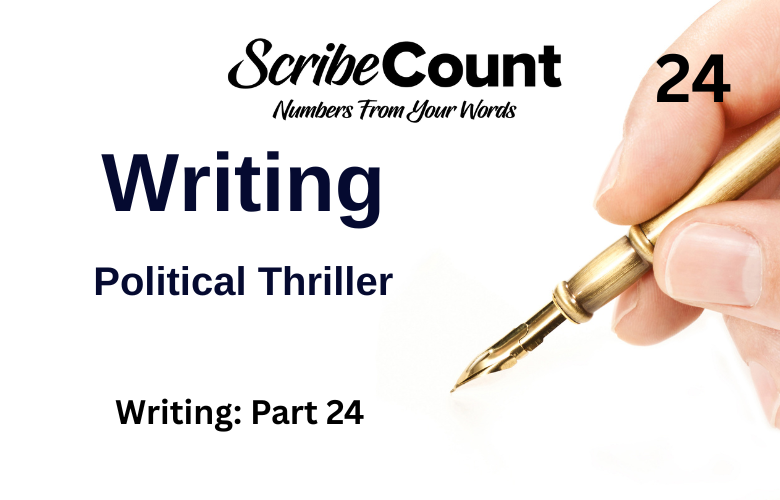Political Thriller for Indie Authors: Writing a Suspenseful Drama of Power, Intrigue, and Deception
Political thrillers are a genre that brings together high-stakes suspense, intrigue, and the complexities of power, often set against a backdrop of government corruption, covert operations, or political conspiracies. These novels often explore the dark undercurrents of politics—where power struggles, manipulation, betrayal, and deceit take center stage. Political thrillers are not just about the plot twists—they are about the hidden forces that influence decisions, shape events, and determine the course of history.
For indie authors, writing a political thriller offers the opportunity to dive into the world of politics, government, and the behind-the-scenes machinations that drive power. The genre allows for the exploration of important political themes, like government corruption, social justice, and the ethics of political maneuvering, while crafting a suspense-filled narrative that keeps readers on the edge of their seats. This guide will walk you through the essential elements of writing a political thriller, from creating compelling characters and intricate plots to maintaining the tension and drama that makes the genre so captivating.
What Makes a Political Thriller Novel?
A political thriller is a genre that focuses on political intrigue, often involving power struggles, corruption, covert operations, or conspiracy within government institutions or political structures. The central conflict usually revolves around the protagonist's efforts to expose a political conspiracy, prevent a governmental crisis, or navigate the complex world of power, betrayal, and ethics.
One of the defining features of political thrillers is the political conflict. The plot typically involves a protagonist who is deeply involved in political affairs, such as a journalist, a government official, a political operative, or a whistleblower, who uncovers or becomes entangled in a conspiracy or corruption. This conspiracy or scandal often threatens national security, the integrity of the political system, or the safety of key individuals. The protagonist must navigate treacherous waters, often facing opposition from powerful adversaries who want to keep the truth hidden.
Another key element of political thrillers is suspense. These novels thrive on high-stakes situations, where the protagonist must act quickly and decisively to prevent a catastrophe or uncover the truth. The tension in political thrillers often arises from the protagonist's race against time to expose corruption, thwart an assassination attempt, or protect vital information from falling into the wrong hands.
The protagonist in a political thriller is typically a character who is both intelligent and morally driven, with a deep understanding of the political system. They may be a journalist seeking to expose a scandal, a politician trying to navigate a crisis, or a whistleblower trying to bring the truth to light. These characters often face moral dilemmas, such as whether to sacrifice their career or personal safety to expose the truth or to protect themselves and their loved ones.
The antagonist in a political thriller is often a shadowy figure or a powerful group of people—political elites, corporate tycoons, or government officials—who have a vested interest in maintaining control and suppressing the truth. The antagonist’s motives are often linked to power, greed, or national security, and their actions create intense conflict with the protagonist.
Finally, themes of morality and justice are central to political thrillers. These novels often explore the tension between right and wrong, ethics and pragmatism, and the costs of revealing or concealing the truth. The genre often asks big questions: What happens when those in power abuse their authority? Can justice truly be achieved in a corrupt system?
The Popularity of Political Thriller Fiction
Political thrillers have remained popular for decades due to their ability to tap into real-world anxieties about power, government transparency, and the potential for corruption. Authors like John Grisham (The Firm, available on Amazon), Vince Flynn (American Assassin, available on Apple Books), and David Baldacci (The Camel Club, available on Kobo) have shaped the genre with their thrilling tales of government corruption, espionage, and political conspiracies. These novels often reflect real-world concerns about the influence of politics on everyday life, making them highly relevant and engaging for readers.
For indie authors, political thrillers offer a unique opportunity to tackle timely and important issues, blending suspenseful plots with political themes that resonate with readers. The genre’s wide appeal, especially with its focus on high-stakes conflict and government intrigue, makes it a great choice for indie writers looking to reach an audience that enjoys suspense, drama, and intellectual engagement. Moreover, political thrillers can be adapted to contemporary settings, historical fiction, or even dystopian worlds, offering plenty of flexibility for creative storytelling.
Reader Expectations for Political Thriller Fiction
When readers pick up a political thriller, they expect a story that combines action, suspense, and intellectual intrigue. Several key elements define what readers expect from this genre.
First, readers expect a complex, gripping plot. Political thrillers are known for their intricate plots, which often involve conspiracies, hidden agendas, and complex political systems. Readers expect to be drawn into a web of secrets and revelations, where every twist and turn uncovers new layers of intrigue. The plot should keep the reader guessing, with surprising reveals and carefully placed clues that build toward a satisfying climax.
Second, readers expect believable political dynamics. Whether the story is set in a fictional world or based on real-world politics, the political aspects of the story must feel authentic. This includes accurate depictions of the political system, the motivations of politicians, the power struggles between different factions, and the ethics of political maneuvering. Readers want to see the characters navigate the complex and often morally gray world of politics.
Third, readers expect strong, multi-dimensional characters. The protagonist should be someone the reader can root for, often a person of integrity who is willing to fight against the odds to expose the truth. The antagonist, whether it's a corrupt politician, a criminal mastermind, or a shady corporate entity, should also be well-developed and present a credible threat to the protagonist’s mission. The tension between the protagonist’s ideals and the antagonist’s goals creates compelling drama.
Finally, readers expect a satisfying resolution. While political thrillers can often leave room for ambiguity or open-ended conclusions, readers expect the central conflict of the novel to be resolved in a way that makes sense. Whether the protagonist uncovers the conspiracy, stops the criminal plot, or wins a moral victory, the resolution should provide closure and a sense of justice.
Common Tropes in Political Thriller Novels
Political thrillers often feature certain tropes and conventions that readers expect, but the best authors know how to subvert or innovate on these tropes to create fresh and compelling stories. Some common tropes in political thriller fiction include:
- The Whistleblower: A character who exposes government corruption or corporate malfeasance, often at great personal risk. This character is typically the protagonist, fighting to reveal the truth despite opposition from powerful forces.
- The Political Conspiracy: The central plot of many political thrillers revolves around uncovering a hidden conspiracy, whether it’s a government cover-up, corporate corruption, or political manipulation. The protagonist’s goal is to expose the truth and stop the conspiracy before it’s too late.
- The Power Struggle: Political thrillers often involve characters who fight for control, whether it’s within a political party, a government agency, or an international organization. These power struggles are central to the conflict and often involve manipulation, betrayal, and deception.
- The Corrupt Politician or Official: Many political thrillers feature a villain who is a corrupt government official, corporate leader, or political figure who abuses their power for personal gain. The protagonist’s goal is often to expose this corruption and bring the villain to justice.
- The Race Against Time: The tension in many political thrillers arises from a time-sensitive threat, such as preventing an assassination, stopping a terrorist attack, or exposing a conspiracy before it destroys lives. The protagonist must work against the clock to prevent disaster.
- The Insider Threat: In some political thrillers, the antagonist is someone within the political system or organization—an insider who is secretly working against the protagonist or the greater good.
Structuring Your Political Thriller Novel: The Plot Map
Here’s a simple plot map you can follow when planning your political thriller novel, ensuring that the political intrigue, suspense, and character development build in a compelling way:
- Normal World: Introduce your protagonist in their everyday life, often in a political or governmental setting. This is where the reader learns about the character’s background, motivations, and the political environment they operate within.
- Inciting Incident: The protagonist is introduced to the central conflict—whether it’s uncovering a conspiracy, being tasked with a high-stakes political mission, or stumbling upon a dangerous secret that puts them at odds with powerful forces.
- Rising Action: The protagonist investigates, uncovers evidence, and faces increasing opposition. This is where the tension builds, as the protagonist confronts political adversaries, uncovers hidden truths, and struggles to balance their moral compass with the dangers around them.
- Climax: The protagonist faces the ultimate showdown with the antagonist, whether in a public political confrontation, a courtroom, or a clandestine meeting. This is where the truth is revealed, and the protagonist must act to prevent disaster.
- Resolution: The story concludes with the resolution of the political conflict. The protagonist either exposes the conspiracy, prevents a political disaster, or navigates the fallout from their actions. The resolution should offer closure and a sense of justice.
Final Thoughts for Indie Political Thriller Writers
Writing a political thriller offers an exciting opportunity to explore the intersection of power, politics, and suspense. The genre allows you to tackle timely and relevant issues, blending high-stakes drama with complex moral dilemmas and intellectual challenges. Whether your story revolves around a conspiracy, a political scandal, or the fight for justice in a corrupt system, political thrillers provide ample room for creativity and storytelling.
As an indie author, you have the freedom to create gripping, politically-driven narratives that keep readers on the edge of their seats. By balancing intrigue, suspense, and social commentary, you can craft a political thriller that resonates with readers and offers a thrilling ride through the world of power, politics, and deception.

